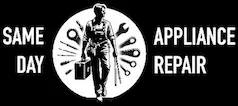Commercial Ovens Repair Cost
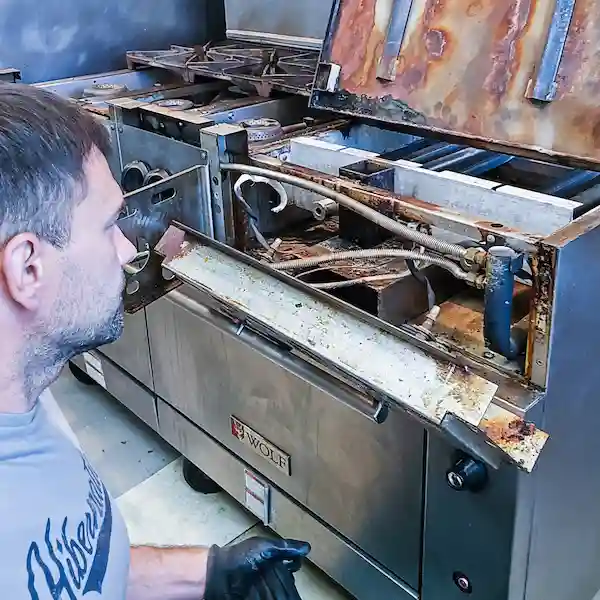
At Same Day Appliance Repair, we are a family-owned business committed to enhancing your customer experience. We understand the frustration of appliance repairs, and we pride ourselves on our transparency and reliability. This page is created to give you a thorough understanding of our pricing policies, the costs associated with a commercial oven repair, and our unique approach to service designed to relieve you of the stress of appliance breakdowns.
We understand the importance of keeping your commercial oven units running efficiently without breaking the bank. We offer competitive pricing tailored to your specific repair needs and guarantee transparent cost estimates with no hidden fees, ensuring you feel comfortable about the affordability of our services.
Have Questions? We're Here to Help!
Feel free to call us if you have any questions. Our team is dedicated to helping you and making sure you're happy.
How Much Does It Cost To Repair a Commercial Oven?
The typical cost to repair a commercial oven varies from $100 to $1200, including parts and labor. The price can vary based on the issue type and your appliance's brand and model. Our technician will first need to diagnose the problem to provide you with the most accurate estimate. Following the diagnosis, you'll receive a detailed price breakdown.
Our Pricing Policy For Commercial Oven Repair And How We Work
There are four costs to consider when making your commercial oven work optimally.
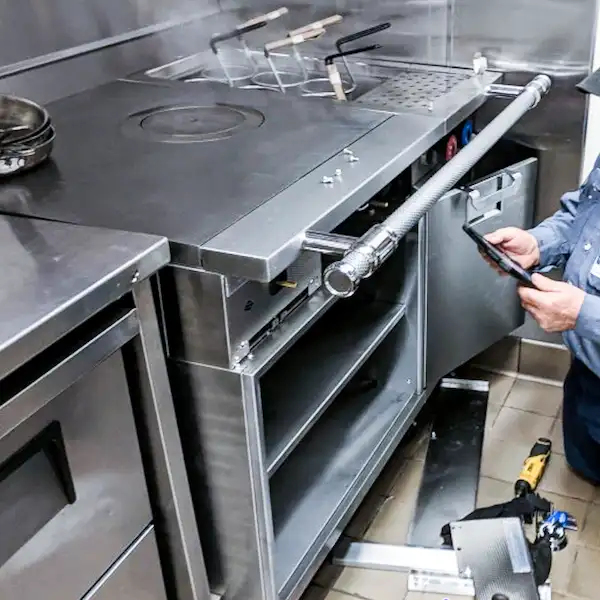
Maintenance Cost
Regular maintenance is essential for your oven's longevity and optimal performance. We recommend annual maintenance, which includes thorough cleaning, inspection and calibration of controls and safety mechanisms, checking and replacing components, operational testing, lubrication, and documenting all checks and repairs, is crucial for ensuring efficient and safe operation, thus extending the lifespan of these appliances. Our flat fee for this comprehensive service is $125 for one oven. If you want our technician to perform maintenance on two or more ovens, the cost will be $80 per unit.
This preventive approach not only saves you money by reducing the need for repairs but also enhances the efficiency and lifespan of your appliance. Schedule your maintenance appointment with us today and ensure your commercial oven runs smoothly.
Service fees
If your commercial oven requires repair, we charge a service fee of $80, which includes a detailed price breakdown. This fee is waived if you choose to proceed with the repair. Unlike some companies, we guarantee you will not pay this fee if we cannot diagnose properly. Our technicians are highly trained and equipped with specialized tools to accurately diagnose and resolve issues, ensuring transparency and fairness in our charges.
Labor cost
See prices below. The cost of labor depends on the complexity of the commercial oven repair and the estimated time required. We ensure transparency by providing a detailed quote before you commit to the service. Should the repair take longer than expected, you won't be charged extra; we waive the diagnostic fee upon proceeding with the repair, and you will pay the cost of the repair and parts if needed.
Replacement Parts
See prices below. While not every repair needs new parts, certain situations require replacement parts to restore your commercial oven to peak performance. Our technicians carry various parts in their vehicles, which usually enables same-day repairs. If a part must be ordered, the cost will vary depending on the repair, brand, and model of your commercial oven.
*We always do our best to find parts at a lower price for our customers. We do not make extra money on the parts; our priority is to make it as easy as possible for the customer.
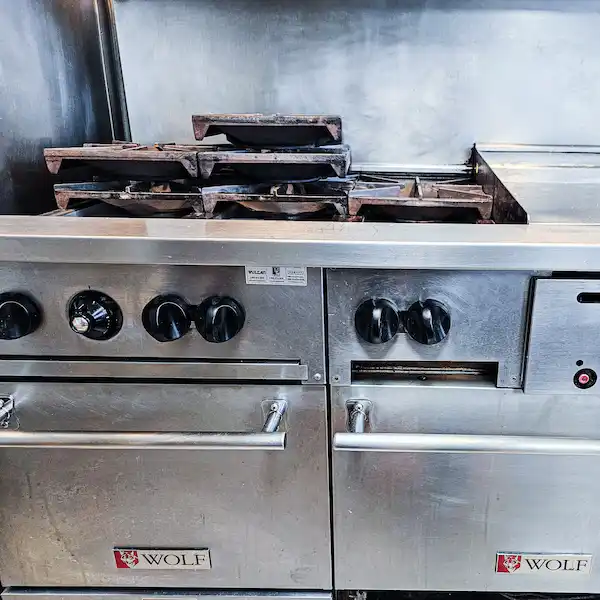
Commercial Oven Repair Cost - Labor Only Excluding Parts
Here are some common problems and price ranges
Oven does not reach the set temperature, overheats, or temperature fluctuates.
Thermostat Replacement Cost
$150 - $300
Gas oven does not light, delayed ignition, or you hear clicking sounds without the burner lighting.
Ignitor Replacement Cost
$100 - $250
Uneven heating, certain parts of the oven not heating, or the oven not heating at all in electric models.
Heating Element Replacement Cost
$100 - $200
Smell of gas in the vicinity of the oven, hissing sound near gas lines. The amount may vary considerably depending on the complexity of the leak and the security measures required
Gas Leak Repair Cost
$150 - $400
Oven not responding to controls, display errors, or oven turning off unexpectedly.
Control Board Replacement Cost
$150 - $350
Oven door does not close properly, heat escaping from the oven door.
Door Repair Cost (e.g., Broken Hinge or Seal)
$100 - $250
Oven not circulating air properly, uneven cooking, or fan not turning on.
Fan Motor Replacement Cost in Convection Ovens
$120 - $300
Commercial Oven Replacement Parts Cost
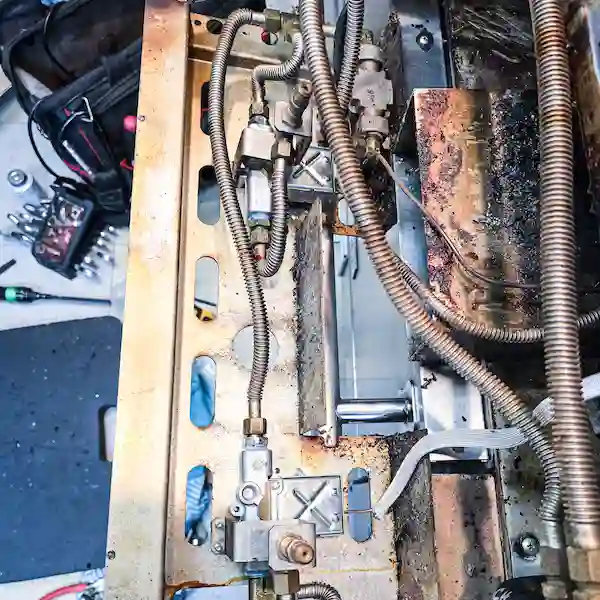
Regulates the oven's temperature to ensure accurate heating according to the set requirements.
Thermostat
$50 - $200
$30 - $150
Electric coils or gas burners that heat the oven.
Heating Element
$40 - $300
Controls the flow and pressure of gas to the burners, crucial for maintaining safe operation.
Gas Valve
$100 - $400
The electronic board that controls various oven functions, including temperature settings and timer operations.
Control Board
$150 - $600
$20 - $100
$10 - $50
Powers the fan that circulates hot air inside convection ovens, ensuring even cooking.
Fan Motor for Convection Ovens
$100 - $400
$50 - $200
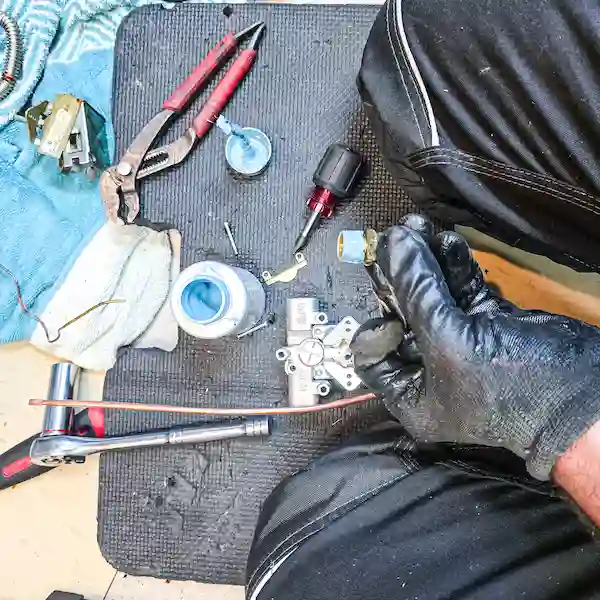
What is Included in the Annual/Semi-annual Commercial Oven Maintenance
Annual or semi-annual maintenance is essential for ensuring that commercial ovens, including gas ovens and convection ovens, operate efficiently and safely, thereby extending their lifespan. Here's an outline of tasks typically included in the maintenance of these appliances:
- Cleaning:
- Interior and Exterior: Remove debris from inside the oven, including the oven door, and clean the exterior to maintain functionality and appearance.
- Exhaust System: Clean the exhaust system to prevent grease buildup, which can be a significant fire hazard.
- Inspection and Calibration:
- Oven Thermostat: Calibration of the oven thermostat is crucial to ensure the oven heats to the correct temperature and provides consistent heating.
- Temperature and Safety Controls: Check and adjust controls, inspecting safety mechanisms to prevent overheating and other hazards.
- Component Checks:
- Heating Elements: Inspect the heating elements for damage and replace if necessary.
- Gas Components: For gas ovens, inspect gas lines and connections for gas leaks and ensure efficient operation of burners and the pilot light.
- Electrical Connections: Check for faulty wiring and ensure all connections are secure to prevent electrical hazards.
- Operational Testing:
- Control Board and Fan Operation: In convection ovens, ensure that the fan motors and control board are functioning correctly for optimal hot air circulation.
- Lubrication:
- Moving Parts: Lubricate any moving parts, such as door hinges, to ensure smooth operation.
- Safety and Performance Checks:
- Performance Testing: Conduct tests to verify that the oven reaches the set temperature and operates efficiently.
- Safety Verifications: Ensure all safety features, including emergency shut-offs, are operational.
- Documentation and Recommendations:
- Service Records: Document all inspections, tests, and component replacements.
- Professional Advice: Based on the findings, a commercial oven repair technician may recommend further repairs or parts replacement to enhance efficiency or performance.
Regular maintenance checks by a professional commercial oven repair service are recommended to address any potential issues such as worn components or gas leaks, which could affect the oven's performance or pose safety risks. This proactive approach helps manage repair costs more effectively and ensures the reliability of your commercial kitchen appliances.
FAQs
What Brands of Commercial Ovens Do You Repair?
We repair all major brands of commercial ovens, including but not limited to:
- Vulcan: Known for durable, advanced convection ovens that offer consistent cooking results and are built to last.
- Southbend: Recognized for energy-efficient convection ovens with advanced heat distribution technology.
- Cadco: Offers commercial convection ovens with innovative designs, programmable controls, and user-friendly interfaces.
- Alto-Shaam: A leading manufacturer of combi-ovens, known for intuitive and dependable designs.
- Rational: Pioneers in combi-oven technology, famous for their intelligent iCombi Pro and reliable iCombi Classic models.
- Unox: Focuses on efficiency, optimization, and innovation in their commercial oven designs.
For professional repairs on these brands and more, contact us to ensure your kitchen equipment operates efficiently and safely.
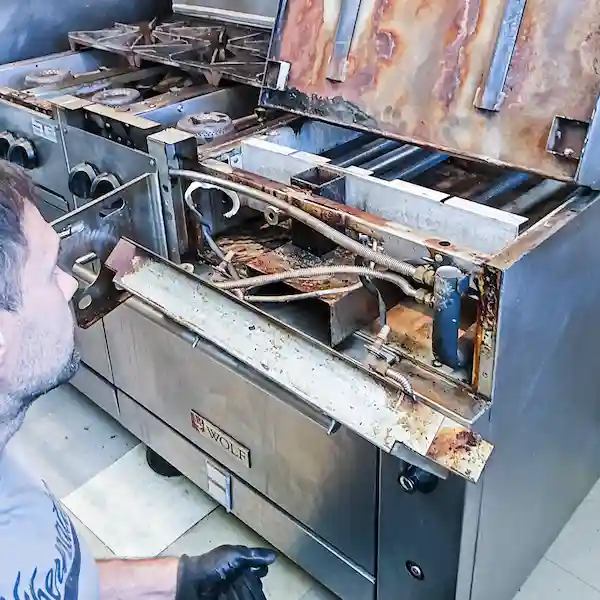
What are the differences between gas and electric commercial stoves?
When comparing gas and electric commercial stoves, gas stoves offer more responsive temperature control and higher maximum temperatures, making them ideal for various cooking activities, whereas electric stoves excel in providing consistent heat, beneficial for baking and precision tasks. Gas stoves tend to be more energy-efficient with lower long-term operating costs, despite higher initial setup requirements due to necessary gas lines and ventilation systems, while electric stoves are initially cheaper and easier to install. Gas stoves often feature versatile cooktop options like open burners and griddles, whereas electric stoves boast a smooth surface that simplifies cleaning. Safety and regulatory considerations also differ, with gas stoves requiring stringent safety measures and adequate ventilation to prevent issues like gas leaks, making maintenance checks by a commercial oven repair service crucial for operational safety and efficiency.
What Types of Commercial Ovens Do You Repair?
We repair all kinds of commercial ovens, ensuring your kitchen maintains its efficiency and safety. Whether it's a convection oven that needs its fan fixed or a steam oven that isn't generating enough steam, our skilled technicians are here to help. We specialize in all forms of commercial oven repairs, from heating elements issues to complex problems like gas leaks or faulty wiring.
Our services include:- Commercial Oven Repair Service: We handle repairs for all types of commercial ovens, ensuring they heat properly and meet your cooking needs.
- Heating Element and Oven Igniter Replacement: If your oven isn't heating up, the issue might be with the heating elements or the igniter. We can replace these parts quickly and efficiently.
- Gas Leaks and Pilot Light Issues: Safety is crucial in commercial kitchens. We address gas leaks and pilot light problems to prevent hazards.
- Thermostat and Control Board Repairs: Ensuring your oven cooks at the set temperature is vital for food safety and quality. We repair thermostats and control boards that affect temperature regulation.
Understanding the importance of minimizing downtime in your commercial kitchen, we strive to provide quick and reliable service. Our technicians are experienced with all types of ovens and are equipped to handle both minor repairs and major fixes, ensuring your oven operates smoothly and your food service continues without interruption.
For any issues with your commercial ovens, don't hesitate to contact us. We offer competitive repair costs and are committed to providing cost-effective solutions for maintaining your kitchen appliances in top condition.
What are the most important features to consider when buying a commercial stove?
When selecting a commercial oven, understanding various factors related to maintenance and repair is crucial. The cost of oven repairs can vary widely, depending on the specific service, like replacing heating elements or addressing gas leaks. Engaging a professional commercial oven repair service or a skilled technician is advisable for complex issues like oven igniter replacement or fixing faulty wiring.
For routine maintenance or minor issues, understanding the oven's components such as the thermostat, control board, and exhaust system is beneficial. It's also essential to be aware of the potential for more significant problems like gas leaks, which require immediate attention to ensure safety in a commercial kitchen.
Moreover, the type of oven—whether it's a gas oven, steam oven, or convection oven—will influence both the repair approach and the costs involved. Gas appliances, in particular, may have specific needs such as pilot light adjustments or gas supply checks.
Ultimately, the decision to repair or replace a commercial oven depends on the severity of the issue, the age of the appliance, and the cost-effectiveness of a repair versus replacement. Regular maintenance can help extend the life of an oven, making it a more cost-effective solution in the long run. Balancing these considerations will help maintain the oven's functionality and safety, ensuring it performs well for cooking at the desired temperatures and conditions.
Do I need a commercial oven repair service?
Suppose your commercial oven isn't heating to the correct temperature or is cooking food unevenly. In that case, it might be due to issues with the heating element or oven sensor, necessitating a check from a commercial oven repair technician. Regular maintenance and tune-ups by a professional can ensure your oven works efficiently and help avert more costly repairs later.
If the pilot light doesn't stay lit for gas ovens, this could indicate a problem with the thermocouple or safety valve, requiring specialized attention. Addressing minor issues promptly can prevent them from escalating into major repairs that could heavily impact your business operations.
Investing in a reliable commercial oven repair service is crucial for maintaining its performance and extending its lifespan. This approach helps manage repair costs effectively and ensures your oven continues to operate properly, supporting your culinary ventures without interruption.
What Can Be Broken if Commercial Oven Not Heating?
- Heating Element: This is often the primary cause when an oven fails to heat. If the element is damaged or faulty, it won't properly heat the oven.
- Oven Sensor: A malfunctioning oven sensor can lead to inaccurate oven temperatures, preventing the oven from heating correctly.
- Safety Valve (for gas ovens): In gas ovens, a defective safety valve can prevent gas from reaching the oven, thereby affecting the heating.
- Igniter: Also specific to gas ovens, a faulty igniter can prevent the oven from heating if it fails to light the gas.
- Thermocouple: This component is crucial in gas ovens for keeping the pilot light lit. If it fails, the oven won't heat.
- Pilot Lights: If the pilot lights are out or malfunctioning in a gas oven, this will directly affect the oven's ability to heat.
Addressing these issues usually requires the expertise of a commercial oven repair technician to diagnose and fix the problem efficiently.
Why does my stove work but not my oven?
If your stove is functioning but your oven isn't, the issue could be tied to several specific components or systems within the oven that don't affect the stove. Here are some potential reasons why this might be happening:
- Oven Igniter or Pilot Lights: For gas ovens, a common issue is with the igniter or pilot lights. If the igniter is faulty or the pilot lights won't stay lit, the oven won't heat even though the stove burners operate independently and remain functional.
- Heating Element: In electric ovens, the heating element might be burnt out or damaged. This component is crucial for the oven to heat, and its failure doesn't impact the stove top.
- Oven Sensor: A malfunctioning oven sensor can affect the oven's temperature control, leading to inadequate heating despite the stove working well.
- Safety Valve: Specific to gas ovens, if the safety valve is defective, it can prevent gas from reaching the oven burner, hindering the oven's ability to heat up.
- Control Board or Error Codes: Sometimes, the issue could be electrical, such as a faulty control board or specific error codes that halt the oven's operations but leave the stove unaffected.
- Oven Door: A less common issue could be related to a broken latch or seal on the oven door. If the oven door doesn't close properly, it might prevent the oven from reaching and maintaining the desired temperature.
Addressing these issues typically requires the expertise of a commercial oven repair technician, who can accurately diagnose and resolve the problem. Oven repairs, especially for internal components like the heating element or gas mechanisms, can be complex and costly, so professional assessment is recommended to ensure safety and functionality.
How do I know if my oven element is bad?
To determine if your oven element is bad, you can look for several signs and perform a few tests. Here's how to check if the heating element in your oven needs replacing:
- Visual Inspection: First, visually inspect the element for any signs of damage such as blistering, bubbling, or cracks. A damaged element often has visible holes or black spots.
- Lack of Heat: Turn on the oven and set it to bake mode. If the element does not glow red (for electric ovens) or heat up within a few minutes, this is a strong indicator that the element is not working.
- Uneven Cooking: If you notice that your food is cooked unevenly, this can also be a sign that the element isn't distributing heat evenly or effectively.
- Use a Multimeter: To more definitively test the element, you can use a multimeter set to the ohm setting. First, ensure the oven is unplugged and cool. Disconnect the element from the terminals, and place each of the multimeter's leads on one terminal. A properly functioning element should give a reading of 20 to 40 ohms. Significantly higher or infinite readings indicate a faulty element.
- Check for Breaks or Blistering: Carefully examine the element for any breaks in the continuity of the coil or any blistering along the surface. These physical deformities are clear indicators that the element is defective.
If these tests indicate that the oven element is indeed bad, replacement is typically the best option. Replacing an oven element is a relatively straightforward DIY repair, or you can opt to hire a professional technician to ensure the job is done safely and correctly.
How do I know it's time to replace my commercial oven?
Knowing when to replace your commercial oven involves considering several factors that impact the efficiency, safety, and quality of your food preparation. Here are key indicators and considerations to help you decide whether to repair or replace your commercial oven, taking into account various oven types, including steam ovens and gas appliances:
- Oven Temperature Inaccuracies: If your oven is not maintaining the set temperature, it can lead to undercooked or overcooked food, which in severe cases might even risk food poisoning. Most ovens should cook food evenly and at a consistent temperature. If recalibration or basic DIY repairs like replacing the temperature sensor or thermostat don't fix the issue, it might be time to consider a new oven.
- High Oven Repair Costs: When facing a costly repair, such as replacing the tempered glass of the oven door or significant components like the heating element or gas line, you should consider the oven repair cost against the price of a new oven. If the cost of the repair approaches or exceeds 50% of the average cost of a new comparable oven, replacement is often more economically sensible. The repair cost of stove repair can vary widely, but getting estimates can help in making this decision.
- Frequent Breakdowns: If your oven frequently needs repairs, these costs can quickly add up. Most repairs might seem minor, but when they become recurrent, they not only increase downtime but also affect the efficiency of your cooking operations. It's worth fixing an oven if the repairs are infrequent and affordable, but consistent issues might indicate it's time to replace it.
- Availability of Replacement Parts: For older or discontinued oven models, finding the necessary replacement part can be challenging and sometimes more expensive than the part itself. If parts are particularly hard to find, this could significantly increase both the direct cost of the repair and the time your oven is out of service.
- Energy Efficiency and Performance: Newer oven models are typically more energy-efficient and might come with advanced features that improve cooking quality and safety. If your current oven is a gas appliance and you're noticing inefficiencies or concerns with the gas line, upgrading to a newer model might also enhance safety and performance.
- Comparative Cost of New Ovens: Research the cost of new ovens that would meet your needs. If your current oven is nearing the end of its expected lifespan (most commercial ovens last around 10-15 years, depending on maintenance and usage), investing in a new oven might be more cost-effective in the long run.
- Impact on Other Appliances: Sometimes, an old or malfunctioning oven can place additional strain on other appliances in your kitchen. If this is the case, replacing it could help preserve the longevity and efficiency of your entire kitchen setup.
Deciding whether to fix or replace your commercial oven is a significant decision that impacts your kitchen's operational efficiency and the quality of food you serve. By considering these factors—especially the stove repair costs and oven repair costs versus the cost of a new oven—you can make an informed decision that best suits your business needs. Remember, a well-functioning oven is crucial to properly cook food and keep your operations running smoothly.
When running a commercial kitchen, ensuring your oven functions correctly is crucial to your ability to cook high-quality meals. If you notice issues with cooking temperatures or uneven heating, it may be time to consider a stove repair. The decision to fix or replace a commercial oven depends heavily on the oven repair cost and the average cost of a new unit. Typically, if the cost to fix the oven approaches or exceeds 50% of the cost to replace it with a new model, it might be more economical to replace the oven. Regular maintenance can often extend the life of your oven, allowing you to cook effectively without frequent disruptions. However, when persistent problems arise, a timely fix can save you money and maintain the quality of food you cook for your customers. Remember, assessing both the oven repair cost and the average cost of replacement can guide your decision on whether to fix or replace your commercial oven.
